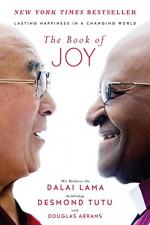
|
| Name: _________________________ | Period: ___________________ |
This test consists of 5 multiple choice questions, 5 short answer questions, and 10 short essay questions.
Multiple Choice Questions
1. What does the Dalai Lama say the Virgin Mary is a symbol of?
(a) Forgiveness.
(b) Sadness.
(c) Sacrifice.
(d) Love.
2. Who is the Dalai Lama's friend from Northern Ireland who he thinks embodies the spirit of forgiveness?
(a) Perry Gordimer.
(b) Michaela Robinson.
(c) Richard Moore.
(d) Amanda Richardson.
3. What does the Dalai Lama say is first necessary before one can bestow kindness on someone else?
(a) One must first find God.
(b) One must first learn to donate to charities.
(c) One must first learn to show kindness to one's family.
(d) One must first learn to show kindness to oneself.
4. Who is the person that it was most difficult for Archbishop Tutu to personally forgive in his own life?
(a) His brother.
(b) His father.
(c) His daughter.
(d) His cousin.
5. What does Archbishop Tutu say is necessary for two friends to be able to joke easily with one another?
(a) Regret.
(b) Trust.
(c) Empathy.
(d) Sadness.
Short Answer Questions
1. What does the term askaris refer to?
2. What is Archbishop Tutu's great regret regarding his father?
3. Abrams writes that generosity is not just about giving money but also about giving which of the following?
4. What does the Dalai Lama say he goes through when he prays five times each day?
5. What does the Dalai Lama recall the Tibetan saying about wisdom says?
Short Essay Questions
1. In Part IV, why did the Dalai Lama laugh so hard when a former Protestant militant in Belfast said the loyalists had always taught him Jesus was Protestant and not Catholic?
2. In Part III, what does the Dalai Lama say happens when he prays to a certain statue in his home every morning?
3. In Part III, what does the Dalai Lama say true arrogance is really an indication of?
4. In Part IV, what does the Dalai Lama say he learned on his flight from Japan to San Francisco in sitting next to a mother with young children?
5. In Part IV, why does Archbishop Tutu say the ability to laugh at himself has served him well in life and allowed him to connect with people?
6. In Part III, what specific advice does the Dalai Lama offer about changing one's perspective for the better?
7. In Part IV, what does Abrams say is necessary in order for people to feel present in each moment?
8. In Part III, what does Abrams's own father say after his terrible experience of traumatic brain injury?
9. In Part IV, what do Archbishop Tutu and the Dalai Lama emphatically agree that the willingness and ability to forgive are signs of in a person's character?
10. In Part IV, what does Abrams explain as a core paradox of happiness?
|
This section contains 875 words (approx. 3 pages at 300 words per page) |

|




